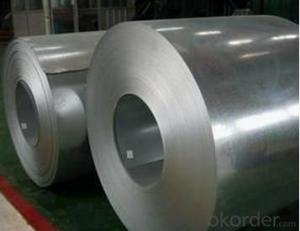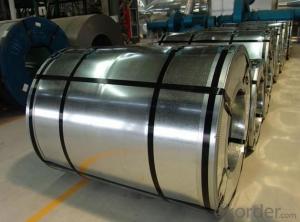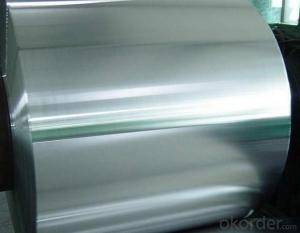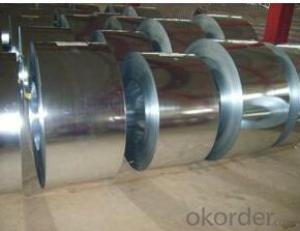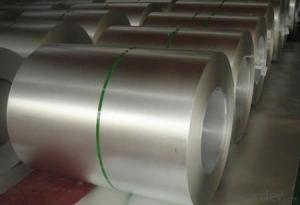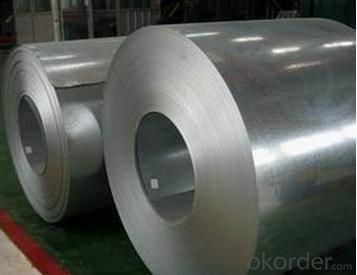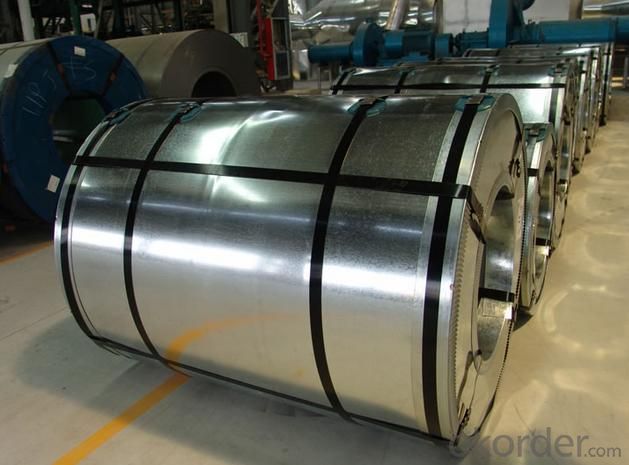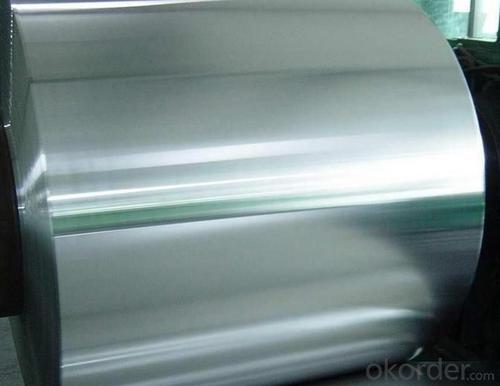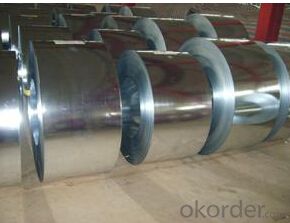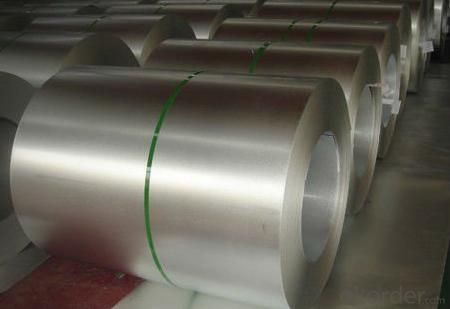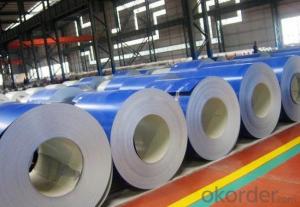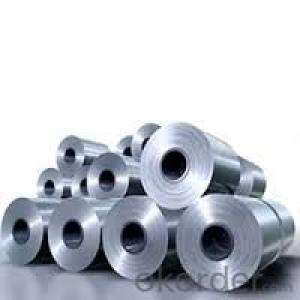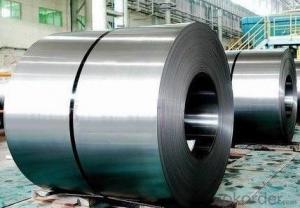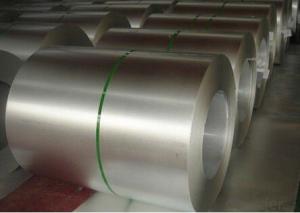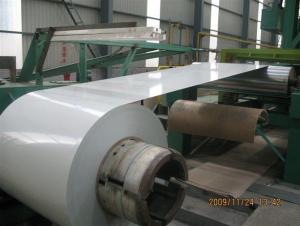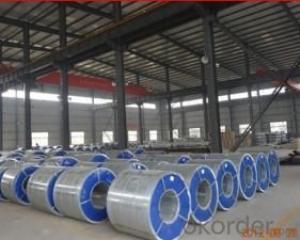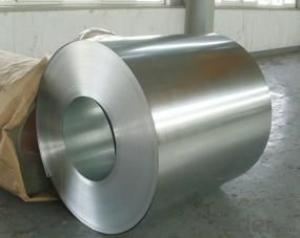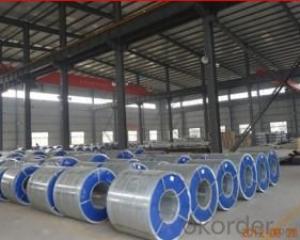Hot-Dipped Galvanized Steel Coil for Construction
- Loading Port:
- Shanghai
- Payment Terms:
- TT OR LC
- Min Order Qty:
- 25 m.t.
- Supply Capability:
- 10000 m.t./month
OKorder Service Pledge
OKorder Financial Service
You Might Also Like
Basic Info.
Model NO.:GT00818
Surface Treatment:Galvanized
Additional Info.
Trademark:GT
Packing:At buyer′s requirement
Standard:GB,JIS,ASTM
Origin:CHINA
HS Code:72123000
Production Capacity:50,000 mt/year
Product Description
Commodity: Hot dipped galvanized steel coil
Size: Thickness: 0.20mm to 1.2mm; Width: 500mm to 820mm
Surface finish: Regular spangle; Small spangle
Surface treatment: Chromated passivation
Zinc coating: Z08, Z12, Z18
Packing: Mill's standard packing for exporting
Usage: used in the industries such as construction ,cold rolling forming and electro mechanics manufacturing, household electric appliance manufacturing and etc
Standard adopted: GB/T2518-1998;Also we supply such steel strips according to JIS,ASTM standard to meet users'requirements.
Steel grade: Q195,Q195L,SPCC(Other material require agreement )
Equivalent standard: JIS G3302 1998 or ASTM A653M/A924M 1998
Price Terms: FOB, CIF Term
Payment Terms: T/T, L/C at sight
Delivery: 15 days after receiving your valid L/C/down payment
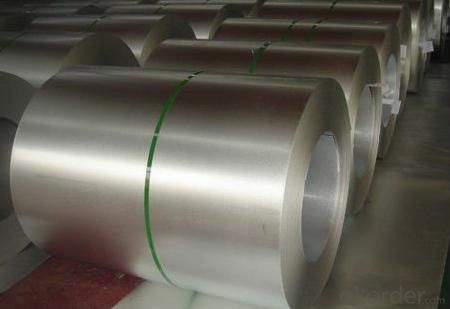
Acceptable payment term and way?
T/T,L/C, T/T + L/C, D/P
Acceptable price term
FOB CNF CIF DDU CPT
Do you accept OA payment terms?
Yes, sure, but it normally depending on the order value
Do you have QC team?
Yeah, sure, our QC team is very important, they will keep the qualitycontrol for our products.
What is the validity of your quotation?
Normally 7 days.
What is your advantage?
24 hour quick response /Customer oriented/ Credit foremost/ Top quality Excellent
What is your acceptable payment term?
TT,LC,OA etc
- Q: How are steel coils used in the manufacturing of shipping containers?
- Steel coils are used in the manufacturing of shipping containers to provide strength, durability, and structural integrity. These coils are processed and shaped into the necessary components, such as walls, floors, and roofs, which are then assembled to create a sturdy container. The steel coils also allow for easy transportation and stacking of the containers, ensuring safe and efficient shipping of goods worldwide.
- Q: What are the different types of steel coil coatings?
- Various purposes require the use of different types of steel coil coatings. Some of the most commonly used types include: 1. Galvanized Coating: This coating, based on zinc, offers excellent corrosion resistance to steel coils. It is often utilized in outdoor applications that subject the coils to harsh weather conditions. 2. Galvannealed Coating: Similar to galvanized coating, galvannealed coating also contains zinc, but it undergoes heat treatment to form an alloy with the steel surface. This type of coating provides superior paint adhesion and is frequently employed in applications where the coated coils will be painted or further processed. 3. Pre-painted Coating: As the name suggests, pre-painted coatings are applied to steel coils before they are delivered to customers. These coatings can be made of various materials such as polyester, polyurethane, epoxy, or fluoropolymer. Pre-painted coils are commonly used in the construction, automotive, and appliance industries. 4. Electro-galvanized Coating: This coating is applied to steel coils through an electroplating process, depositing a thin layer of zinc on the steel surface. Electro-galvanized coatings offer good corrosion resistance and are often employed in indoor applications or where a thinner coating is desired. 5. Aluminized Coating: Aluminized coatings involve applying a thin layer of aluminum to the surface of steel coils. This type of coating provides excellent heat resistance and is commonly used in exhaust systems, ovens, and other high-temperature applications. 6. Organic Coatings: Steel coils are typically coated with organic materials to provide additional protection against corrosion and improve aesthetics. These coatings can come in the form of paints, lacquers, or powder coatings, and they can be tailored to meet specific requirements in terms of color, gloss, and durability. In conclusion, the selection of a steel coil coating depends on the specific application, environmental conditions, desired aesthetics, and performance requirements.
- Q: How are steel coils processed and treated?
- To ensure the quality and suitability of steel coils for different applications, they undergo a series of steps and treatments. Initially, the coil is uncoiled by removing its protective wrapping and unwinding it. Any defects like cracks or uneven surfaces are then inspected. Next, the coil is cleaned to eliminate dirt, oil, and rust using chemical agents and mechanical scrubbing. After cleaning, it is rinsed and dried to prevent corrosion caused by residual moisture. Once cleaned, the steel coil may be treated based on its intended use. One common treatment is pickling, where the coil is immersed in an acidic solution to remove impurities and scale. This improves the surface finish and prepares the steel for further processing. After pickling, the coil can undergo cold rolling, which reduces its thickness and improves dimensional accuracy. This is done by passing the steel through a series of rollers at room temperature, gradually decreasing thickness and increasing strength. It also improves the surface finish. In some cases, the coil may undergo additional heat treatments like annealing or tempering. Annealing involves heating the coil to a specific temperature and slowly cooling it to relieve internal stresses and improve mechanical properties. Tempering, on the other hand, involves reheating the coil to a lower temperature and rapidly cooling it to enhance strength and toughness. Once the desired processing and treatments are completed, the steel coil may be coated or painted for added protection against corrosion or to enhance its appearance. Coating processes can include hot-dip galvanizing, electroplating, or applying organic coatings like paint or powder coatings. Finally, the processed and treated steel coils are cut into specific sizes or shapes according to customer requirements. This can be done using cutting methods such as shearing, slitting, or sawing. Overall, the processing and treatment of steel coils involve cleaning, pickling, rolling, heat treatment, coating, and cutting processes. These steps are carefully carried out to ensure the quality, strength, and suitability of the steel for its intended applications.
- Q: I wanna strip down my bike and take off all the paint... im thinking of leaving it just the steal color... Do i need to put anythinng on the steel to coat it or can i just leave it like that... Will it rust or anything?
- There is another thing you can do to inhibit corrosion on bare metal surfaces. Use a good quality automotive wax. Apply it with diligence, and keep the bike in the garage when you're not using it so it stays dry. Touch up the wax job every now and then to maintain the protective finnish.
- Q: How do steel coils contribute to strength and stability in structures?
- Steel coils are vital components in numerous structures due to their significant impact on strength and stability. The exceptional strength of steel itself makes it renowned, as it can resist large amounts of tension without breaking or deforming. When steel is shaped into coils, its strength is further enhanced by evenly distributing the load across the entire structure. This even distribution of force prevents localized stress concentrations, enabling the structure to withstand heavy loads and external pressures more effectively. Furthermore, steel coils provide stability to structures by offering rigidity and resistance against deformation. Steel is known for its stiffness, preventing excessive flexing or bending under loads. The tightly wound coils create a robust and compact structure that can efficiently resist dynamic forces like wind, earthquakes, or vibrations. This resistance to deformation minimizes potential damage, ensuring the structure's stability and integrity. Moreover, steel coils also contribute to the durability and longevity of structures. Steel exhibits remarkable durability, being highly resistant to corrosion, rust, and deterioration over time. This longevity ensures that structures built with steel coils can remain strong and stable for extended periods, requiring minimal maintenance or repairs. Additionally, steel coils offer versatility in design and construction. The ability to shape steel into various coil sizes and configurations allows for customization based on specific structural requirements. Architects and engineers can utilize steel coils to create complex structures while maintaining their strength and stability. This versatility allows for innovative and efficient design solutions, making steel coils the preferred choice in many construction projects. In conclusion, steel coils play a crucial role in enhancing the strength and stability of structures. The inherent strength of steel, combined with the unique design of coils, provides structures with the necessary rigidity, resistance to deformation, and durability. Additionally, the versatility of steel coils allows for customization and innovative design solutions. Overall, steel coils significantly contribute to the overall integrity and longevity of structures, making them an essential component in the construction industry.
- Q: I have a steel garage, it looks worn out hauled away? How can I maintain / repair it?
- The entire garage is steel? Garage door? Are you able to open and close it without too much trouble? If so, just keep it lubricated. You could paint the door to improve its appearance.
- Q: the difference between the original steel and mild steel from percentage of carbon
- As the first answers suggest, the prolbem is that these terms are not specific, they are not scientifically or technically defined. This is like asking: what is the difference between a four door car and a sedan? There are hundreds of steel alloys ranging from Fe + a little C + very little else to alloy and tool steels with significant amounts of Cr, Ni, Si, and a number of other elements + C. And... for any given steel alloy, there are many different ways to heat treat it. A given piece of steel can be heat treated so hard and brittle that it could shatter like glass and then it could be heat treated to make it into a spring or heat treated to make it stretch like taffy. If you really want to understand steels, yes, there are lots of books on sword making (some written by people who actually understand steels) but... you need to study metallurgy. There are graduate level courses just on the metallurgy of steels. Of course to understand this course you need to understand a whole lot of fundamental metallurgy. All this stuff on steel makes perfect sense because, in terms of weight (tonage) produced, steel is, hands down, nothing else remotely comes close, the most important metal humans have.
- Q: What are the different types of steel grades used for coil production?
- There are various types of steel grades used for coil production, including carbon steel, stainless steel, and high-strength low-alloy (HSLA) steel. These grades are selected based on the specific requirements and application of the coils, such as strength, corrosion resistance, and formability.
- Q: What are the challenges in coil edge trimming for narrow strips?
- Coil edge trimming for narrow strips presents several challenges. Firstly, a major hurdle lies in maintaining accuracy and precision throughout the trimming process. It is imperative to achieve an even and smooth trim on narrow strips, requiring a high level of precision. Any deviation from this precision can result in uneven edges or burrs, which ultimately impact the strip's overall quality. Secondly, controlling strip tension poses another challenge. Due to their limited surface area, narrow strips are more susceptible to tension issues. This can lead to problems such as strip breakage or stretching, ultimately affecting the final product's quality. Furthermore, avoiding material waste is a crucial challenge. Narrow strips allow for less margin of error, meaning any mistakes during trimming can result in a significant amount of wasted material. Minimizing material waste is essential for cost-effectiveness and sustainable manufacturing practices. Moreover, maintaining a high production rate can be difficult with narrow strips. The trimming equipment must handle the high speed required for efficient production while still maintaining accuracy and precision. This necessitates the utilization of advanced machinery and technology to ensure smooth and efficient operations. Lastly, the handling and transportation of narrow strips also present challenges. Due to their small size, narrow strips are more prone to damage during handling and transportation. Implementing proper care and handling techniques is vital to prevent any potential damage that could compromise the final product's quality. In conclusion, the challenges in coil edge trimming for narrow strips revolve around precision, tension control, material waste, production rate, and handling. Overcoming these challenges necessitates the use of advanced technology, skilled operators, and meticulous attention to detail throughout the entire process.
- Q: What are the advantages of using steel coils in various industries?
- There are several advantages of using steel coils in various industries. Firstly, steel coils are highly durable and have a high strength-to-weight ratio, making them suitable for heavy-duty applications. Secondly, steel coils offer excellent resistance to corrosion, which is crucial in industries exposed to harsh environments or chemicals. Additionally, steel coils can be easily formed and shaped, allowing for flexibility in design and customization. Lastly, steel coils are recyclable, making them an environmentally-friendly choice while reducing waste and promoting sustainability.
Send your message to us
Hot-Dipped Galvanized Steel Coil for Construction
- Loading Port:
- Shanghai
- Payment Terms:
- TT OR LC
- Min Order Qty:
- 25 m.t.
- Supply Capability:
- 10000 m.t./month
OKorder Service Pledge
OKorder Financial Service
Similar products
Hot products
Hot Searches
Related keywords
